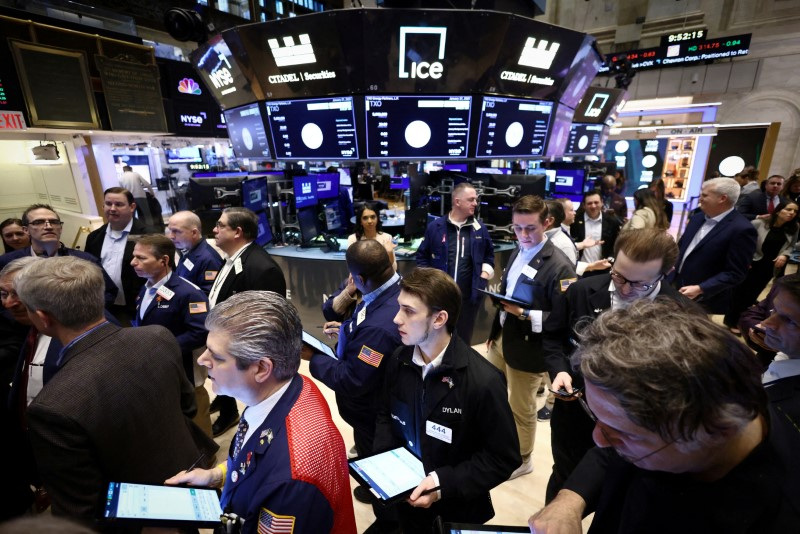By David Randall and Lewis Krauskopf
NEW YORK (Reuters) -Surging U.S. Treasury yields are sending shudders through riskier areas of the market, leaving investors to wonder how badly it will dent a rally that has lifted everything from stocks to bitcoin this year.
Strong economic growth has spurred expectations that the Federal Reserve will leave rates higher for longer, pushing Treasury yields this month to their highest levels since 2007. That climb has made them harder to ignore for holders of stocks and other speculative assets, which have rallied for most of the year even as yields moved steadily higher.
The S&P 500 has lost 4% this month as the U.S. benchmark 10-year Treasury yield climbed to a more than 15-year high of 4.366% on Tuesday. Meanwhile, the S&P 500 technology sector has dropped 5.7%, bitcoin has fallen over 10% and the ARK Innovation ETF - a bastion of many high-growth names - has dropped 18.5%. Stocks rose on Monday, with the S&P 500 closing up 0.7% and futures pointed to a further rise on Tuesday.
Higher Treasury yields - which move inversely to bond prices - can take the shine off speculative assets by offering investors attractive payouts on an investment seen as basically risk free because it is backed by the U.S. government. Rising rates also increase the cost of capital throughout the economy, making it more difficult for everyone from individuals to companies to service debt.
"The day of reckoning is here” for assets such as cryptocurrencies and smaller cap growth companies that burned through cash, said Sameer Samana, senior global markets strategist for Wells Fargo (NYSE:WFC) Investment Institute.
“The biggest, clearest market theme for the next six months at least is to favor the parts of the market that are the least reliant on borrowing and credit,” added Samana, who has unfavorable ratings on small caps, emerging markets, REITS, and consumer discretionary stocks.
A crucial test for markets comes later in the week with the annual gathering of central bankers in Jackson Hole, Wyoming. Fed Chair Jerome Powell is due to deliver a talk on the economic outlook on Friday.
Investors are realizing that "rates are not going to go back down as quickly as they thought," said Matt Maley, chief market strategist at Miller Tabak. "It is causing them to rethink their strategies.”
U.S. investors were net sellers of equity funds for a third consecutive week in the seven days to August 16, according to the latest weekly data from Refinitiv Lipper. At the same time, they have been drawn by high yields in money market funds, pouring in some $32.5 billion over the past week, the biggest inflow since July 5.
Investor equity positioning, as measured by Deutsche Bank (ETR:DBKGn), dropped for a fourth straight week to a two-month low.
But betting against stocks has been a losing trade this year. Many investors believe equities will hold strong in a year that has seen them rebound from widespread recession fears and a banking sector upheaval. The S&P 500 is up 14.6% year-to-date.
Goldman Sachs strategists on Monday said equity holdings by retail and institutional investors stand below their historic norms, suggesting there may be additional fuel left to power the bull market if the economy stays strong.
“Should the U.S. economy continue on its path to a soft landing, we believe the recent decrease in (equity exposure) will be short-lived," the firm's strategists wrote.

Randy Frederick, managing director of trading and derivatives for the Schwab Center for Financial Research, believes S&P 500 earnings likely hit their trough in the second quarter and will expand in the third quarter, pushing the index to a record high by year end. The S&P 500 is over 8% below its January 2022 closing high.
“The era of low rates is gone and new companies that are managing a lot of debt that has to be rolled over at higher rates will struggle," Frederick said. "But we think this is a temporary lull for the market overall.”